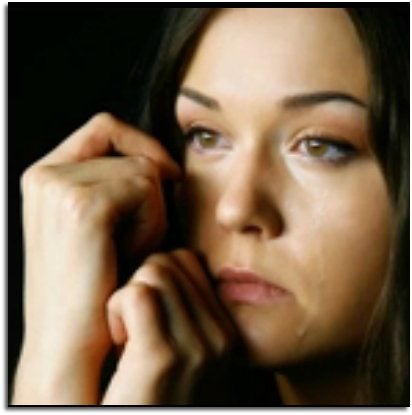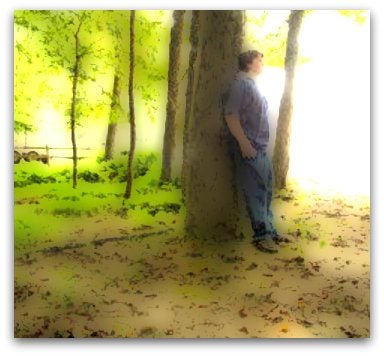Loss and grief after brain injury
Grieving is a normal reaction to loss. It affects the whole being of a person, both physically and psychologically. Previously, it was assumed that people had to go through a series of successive stages of mourning in order to process a loss. If these stages were not completed, complications could arise.
Now it has been increasingly assumed that there are considerable differences in how much time people need to go through a "normal" grieving process. It also needs to be taken into account what the relationship was with what one has lost, the circumstances surrounding the loss. But also with the personal characteristics of the grieving and the social position he or she occupies in society.

Mourning after brain injury is to say goodbye to your old life
With brain injury, there is the 'old life' before the break in the course of life, before the brain injury and a life áfter the brain injury. The 'old life' was shaped by relationships, friendships, clubs, hobbies, (intellectual-) skills, often a profession, vacations and meaning. After the brain injury, these things are no longer obvious.
In this text we call the interpretation of the life before the brain injury the 'old life'.
People who have suffered brain injuries are often in situations in the 'old' life, facing his or her impairment(s). In the early period of the brain injury everything is focused on the largest possible recovery
But back to the 'old' life, it often takes a long time before it really becomes clear what the (in)visible effects are.
The trouble and complaints
People with brain injuries often find that their heads feels like it is 'full'. They find out they cannot recall certain information from their memory. They can hardly stop their thoughts which makes it difficult to fall a sleep. A person with brain injury is easily fatigued and/or often suffers from headaches or a feeling as if a tight helmet is put on.
Personality traits may be different so a person does not understand his/her own reactions. He or she can struggle a lot with himself/herself or the people in the environment will.
These effects of brain injury often arise later. It that stage, people are already working on organizing their lives again according to how it was before the brain injury.
It often happens that people with brain injury do not know that these limitations are related to the injury. They feel that they are failing repeatedly. Also the environment (work, partner, friends, etc.) does not understand what the problem is. One realizes more and more that life was different before the brain injury.

EVERYTHING IS TURNED UPSIDE DOWN
A brain injury turns everything upside down. It is usually an acute event, unexpected and therefore unprepared. (In this specification we are not adressing a degenerative brain injury or a slow-growing tumor). It affects the whole of a person, both physically and psychologically.
The injuries damage a part of the brains that was functioning well before. What exactly the consequences of that damage are is different for each person, but the fact remains that it never recovers completely. We therefore speak of a break in the lifeline.
In addition, the awareness of one's own vulnerability - having looked death into the eye - is a complicating factor.
1 RECOGNITION OF LOSS
In recognizing the loss, it is important that he or she realizes that the 'old life' will never come back. The person and the way of life have changed by the injury.
Provided that the person knows what the consequences of a brain injury involve or even knows that he or she has damage in the brain. Unfortunately even this is not always clear.
The first reaction is usually denial or resignation. Confusion and disbelief are commonplace. This is self-protection. It offers the possibility to let the event sink in in a dosed way. Recognizing the loss is associated with pain and sorrow.

2 RECOGNITION OF FEELINGS
The second 'task' in loss is about recognizing, expressing and living with all the feelings. It focuses on the pain and sadness by the loss first. If the person has acknowledged the pain and the sorrow, the reality can be truly accepted. Knowledge about brain injury, from books, websites or otherwise, is essential to recognize that a complaint may be due to brain injury.
One can experience a range of intense feelings because of the changes within the body or mind. It is essential to feel the emotional pain after the loss of a function and not run away for it.
It is impossible to lose physical, cognitive and emotional functions and not feel emotional pain. People may prefer not to feel the pain, but this would stagnate mourning and the pain will still come up at a later stage.
3 EXPLORING A NEW LIFE
In this 'task', the person with brain injury explores how to live on. At the start every event will confront a person with the loss: back to the family, friends, back to work, and so on. Everything should be given it's place in a pattern that has changed. Gradually the tasks and functions that are still present are deployed to regain life.
Grief is often reactivated when there is a change in life. People often then remember what it was or how it could have been. The person with brain injury must learn to cope with all the changes. The possible lack of physical, cognitive and emotional functions requires adjustment, tools and new skills.
The social environment reacts to that. So this is not just the change in daily life, but also to changes in the way the environment looks at the person with brain injury and how he or she sees him/herself.
4 INTEGRATING LIFE WITH BRAIN INJURY
People will slowly withdraw emotionally from the loss. This implies that the emotions do still exist but will decrease in intensity. This creates space for picking up (new) activities.
CHILDREN AND BRAIN INJURY AND GRIEF
Children have the right to honest information. They feel flawlessly when something is wrong. Children also experience pain, but can discern less than adults. For example, grief can be expressed by anger. For children it is important to express, to experience and to recognize different feelings in a way that fits with their developmental age.
Each event will have it's first time that confront a child with loss: back to the family, playing with friends, back to school, etc. The child must actually regain confidence in him/herself and in the world. This confidence is destroyed at once by the incur of brain damage. Fear, sadness, anger, disappointment are emotions that may come forward.
In addition, it can be difficult for children to go through mourning stages, because sometimes the relevant affected function only develops at a later stage. This creates new support issues, such as questions about school, career, a recurring desire for more autonomy of the child or problems in dealing with the child in puberty.
In children, the effects of brain injury is not stable. The brains develop up to the age of about 25 years. "In each new fase in life one notices again "what could have been but is not." This is a lifelong process of mourning." (Hermans et al, 2012)
Grief and loss for siblings and children of a parent with brain injury
We wish to give a special place to the recognition of grief and loss if your brother or sister is affected by brain injury. The first period can be so stressy, and even fearful and siblings or children of a parent with brain injury, often try to do their best not to bother the other members of the family. They often look strong-on the outside....
 But...
But...
Who is thinking about you? Who sees your trouble and sorrow, or what keeps you busy? After all, the entire life is turned upside down.
Are you angry, but on the other hand you have compassion and understanding? It's not fair that your sister or brother with brain injury gets all the attention. Or do you miss your mom /dad in the way she used to be? Is he/she totally different now? Who wonders how you are doing?
Do you miss your former cozy family? Do you know not enough what's going on with your brother or sister? What is going on inside the head? You have trouble to grasp all medical terms? Don't you know enough of what exactly is going to happen soon ... when your sister or brother, mother or father is home again? Is it less fun at school?
Try to express your questions or anger by writing them down. Try to discuss it some day with someone you trust. But do not put it all away in a dark corner of your lonely mind...! Know that there may be help for you. Even professional help. Take a look on the internet, for example: this site or ask your doctor, find a neuropsychologist who also cares for the siblings. They do exist! We wish you all the best... !!
ART THERAPY

Art therapy is an experiential therapy in which the change and awareness in the perception takes place. We work in art therapy with different creative resources.
Art therapy is an opportunity to treat people with brain injury and loss issues because the visual work is a form that can confront the feeling in bereavement.
It can recast life and be the closing of certain processes.
Here one does not always have to explain what happened verbally. The road to the art (process) and the art itself, often says it all.
Art therapy is a therapy that matches the imagination and experiential learning style of the child. The child will learn in a playful way to deal with (un)conscious feelings and behaviors. However, art therapy does the same for adults.